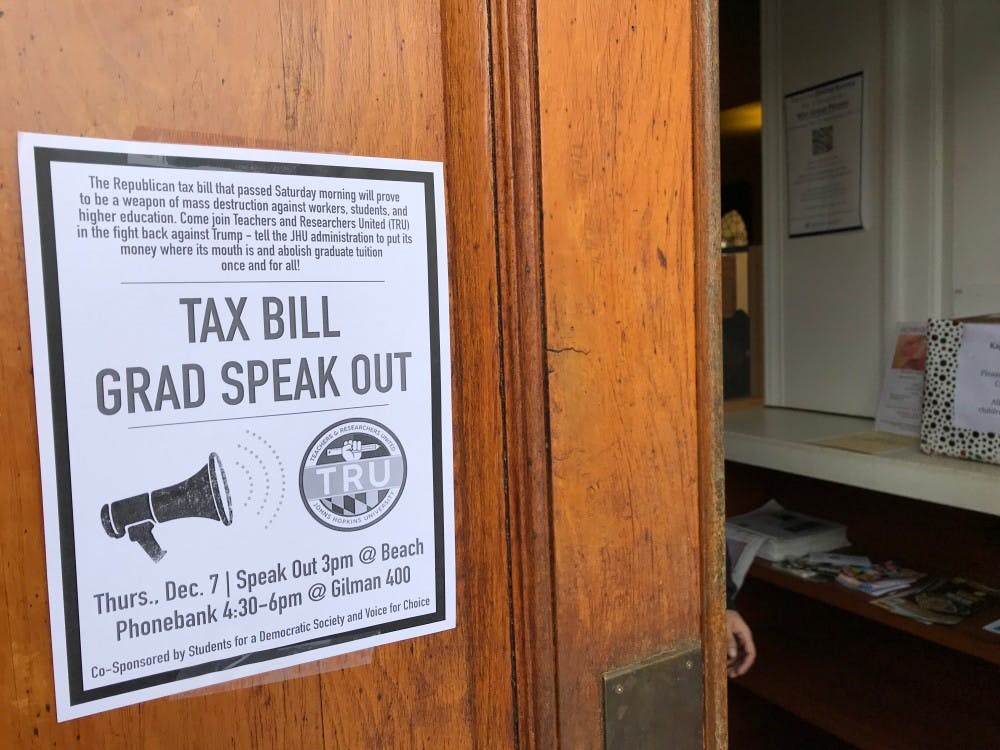Last month, Republicans in the House of Representatives passed a tax reform bill intended to provide tax cuts for both corporations and individuals. On Saturday, Dec. 2, the Senate passed their version of the bill with 51 votes.
The House’s version of the bill includes a provision that would repeal current tax exemptions on graduate students’ tuition waivers. The Senate bill does not currently contain this provision.
If this provision passes after the Senate goes to conference, students whose tuition waivers are tied to employment, such as teaching assistants and research assistants, would have to pay taxes on their tuition. However, students who receive fellowships or scholarships would not have to do so.
On Tuesday, University administrators sent an email to graduate students to inform them of recent developments. the email reaffirmed the school’s opposition to the bill and said it was preparing a contingency plan.
“University leadership and our federal affairs team continue to monitor this legislation very closely and communicate directly with elected officials about its impacts, including expressing our strenuous opposition to repeal of tuition-related exemptions, deductions, or credits,” they wrote.
Additionally, the University said that it is collaborating with graduate students to address their concerns and will work to provide ongoing updates.
“Students have expressed the importance of getting regular updates about what is happening legislatively and what the university is doing in response. We agree and will do our best to keep you informed,” they wrote.
The Graduate Representative Organization (GRO) has been communicating with the administration and delivered a petition to the Office of the Provost. Mikhail Osanov, GRO chair, said that the organization has been working with the administration.
“We assume that they couldn’t address certain points simply because of the time frame,” Osanov said. “It’s not clear yet what the final version of the bill will be, but they are actively lobbying on our part and making sure that we are covered as much as we can be.”
He also said that GRO will continue to work toward opposing this bill.
“We still have to move forward with the same approach that we have been following so far because this is not the end,” he said. “We really should be pushing with the same agenda to make sure that the provisions that hurt us are not included [in the final bill]. The fight is not over.”
Another graduate student organization, Teachers and Researchers United (TRU), will be organizing an event on the Beach on Thursday, Dec. 7. The event aims to raise awareness of the tax plan and will feature both undergraduate and graduate student speakers.
Additionally, on Thursday, Dec. 14, TRU will be hosting a call-a-thon for students to reach out to members of Congress to try to get them to drop this provision.
Samantha Agarwal, a sociology PhD student and TRU member, said that for the majority of their PhD programs, students spend more time working as researchers and TA’s and do not take coursework.
She suggested that the University could work around this tax provision by not charging graduate students tuition.
“If they value their graduate workers and they want to be more fair and equitable they should do that,” Agarwal said.
She emphasized how the tax provision would make it difficult for many students from working and middle class backgrounds to attend the University and said that TRU views the tax plan as a massive upward distribution of wealth.
“We are organizing because we believe that in order to improve our working conditions we have to build solidarity with other workers across the campus, across Baltimore and across the country,” Agarwal said.
Rhiannon Miller, a PhD student in Sociology, echoed Agarwal’s concerns, saying that the University has a responsibility to ensure that graduate students are provided a living wage and equal opportunities regardless of their backgrounds.
“The University — if the bill passes — has a responsibility to react,” she said. “If they didn’t act, they would be complicit in basically closing off this opportunity of higher education to those who aren’t from very wealthy financial backgrounds.”
She said that while the provision on graduate student tuition directly affects a relatively small population, it would nevertheless have drastic consequences.
“There is a part of me that doesn’t believe that it will be passed because of the practicalities of it,” Miller said.
Peter Weck, a physics PhD student, said that he has been disappointed with the University’s communication with graduate students and their response to the Senate bill passing.
“I’m glad that they sent a follow up, but there’s a lot lacking. I was not impressed by their response,” Weck said.
Weck wants reassurances from the University that graduate students would not have their take-home pay reduced. He also wants the University to make graduate tuition nominal, non-existent or at least reduced.
“We’d like to see a solid reassurance that if this tax bill goes through, it will not cut our salaries to something like two thirds to one half of our starting salary,” he said.





